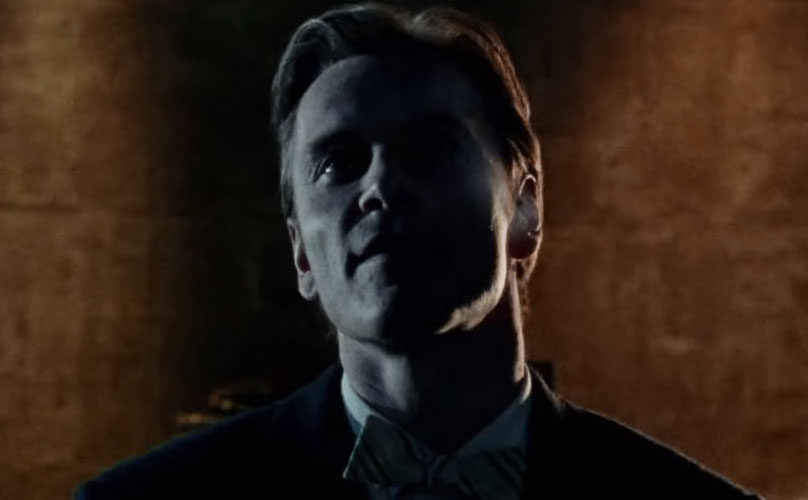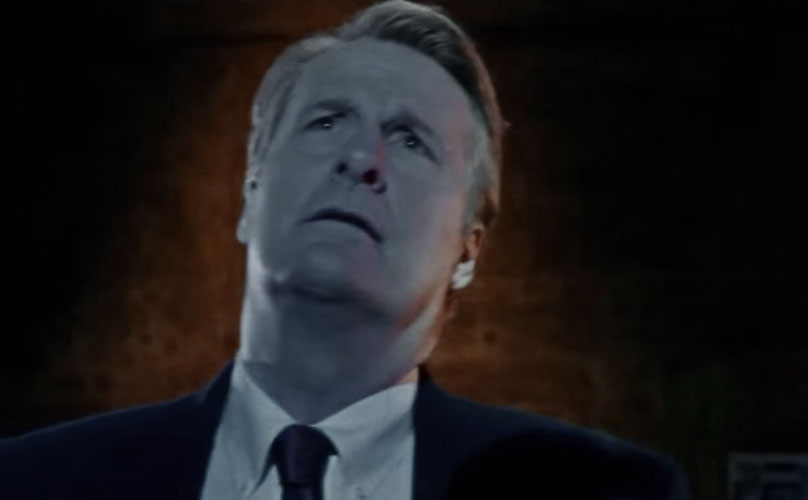
|

|

|

|

|

|

|

|

|

|

|

|


Thanks to his Emmy-winning work on The Newsroom, Jeff Daniels already had plenty of experience delivering Aaron Sorkin's maximalist dialogue when he took on the role of Apple CEO John Sculley in Steve Jobs. But even if he hadn’t, it’s common knowledge that Jeff Daniels can do pretty much anything—after all, his last movie before Steve Jobs, excluding The Martian, was Dumb and Dumber To, a stark departure from Sorkin’s verbal acrobatics. Vulture caught up with one of the most multifaceted actors in Hollywood to talk Sorkin, Steve Jobs’ handling of the real-life Jobs and Sculley, and the thrill of acting opposite Michael Fassbender.
Why was the role of John Sculley appealing? What did you see in that guy that intrigued you? Initially, it was just the fact that Aaron wrote the script, and he asked me on the set of The Newsroom if I wanted to play Sculley. I said, “Yeah.” He goes, “OK.” That was it. Then it was, you get the script and you see this wonderful Shakespearean fall that he’s written, with a beginning, a middle, and an end, which is typical of Aaron. He writes for ensembles, which also means that the supporting characters in his projects have beginnings, middles, and ends. Sometimes, on some other thing, you’re pushing plot, or spewing exposition, and then the hero makes a speech. But not with Aaron. It was the case on Newsroom; it’s the case on Jobs.
As you note, one of the most interesting things about the way Aaron tells the story is the three-act structure, which is very literal with the time jumps and the different events. Why do you think that worked so well as a way to tell the story of Steve Jobs and these people around him? You read Walter's book, and you wonder: how the hell is he going to do this? He came up with a way, and it fits the three-act structure, which every story is based upon. He just made it more public: three acts, three different launches, a beginning, middle, and an end. It was a way to send a signal that it's not a biopic—it’s not cradle-to-grave—and also says we’re going to put some things in peoples' mouths that they did't necessarily say, but we feel reflect how they felt at the time.
A lot of what Sculley and Jobs went through didn't happen at these launches. But that's the license we're taking as we try to make a movie out of the book. I thought it was inventive, and reflected what people were feeling. It was similar, not in structure but in approach, to Gettysburg: [Colonel Joshua Lawrence] Chamberlain didn’t say 75 percent of the things that I said in that movie, but we were allowed to do that. These were real people, at the time when there was a hell of a lot more history going on than in Jobs, and it helped tell the story. No one was holding us to, did Chamberlain say this and did Chamberlain say that.
Aaron took the same license to portray how they feel versus what exactly they said. Sculley saw the movie and it was nice to hear him talk about that, that I’m not getting hung up on what Jeff was saying as much as what he was going for, which really tells the story of what I was feeling at the time. I think that’s what Aaron set out to do. If you want details and absolute accuracy, go make a documentary.
During the movie your physicality changes, as does the way that you interact with Michael Fassbender. I was wondering about the thought process you went through in trying to show how the Jobs-Sculley relationship evolved over time. It was so obvious that it was a Shakespearean fall. So how do you jump off that cliff? Part of it was to let myself carry some more weight and take it away as I went. I wish I had more time to lose thirty pounds, but I lost weight for it in the time we had to shoot it. That helped. It wasn't necessarily Sculley—he's a pretty thin guy. But I thought, I want to peel away. I want to disintegrate a little bit. I want to go from being completely powerful and in charge at the top of his game, which he was: he was a marketing rock-star at Pepsi. And I’m a father figure. All of that in that first scene.

The second scene allows me to start in a position of power, sitting in that chair, going, You really need security, and then getting up. As we were in rehearsals, I said, I’m here to ask Steve basically to stop telling people that I fired you. And Steve should say, you're right, I'm sorry, I'm completely screwing this up, let's have a drink. That’'s how the scene’s supposed to go, and it doesn't, and as it doesn't go that way, he's now realizing he's going to ruin me and I've got to fight for my reputation. This isn’t just about Apple, it’s about ruining me. It goes beyond just, I disagree with your business decision. It’s, Not only do I disagree, I’m going to bury you. So you go from the position of power, sitting in the chair, to tears in your eyes, realizing your life just changed in that hallway.
To do that in ten minutes, with the cutaways to the other scene, it's a wonderful — I mean, again, that's Aaron. He writes that in, and then we jump on top of that and enjoy the ride. Then at the end—in a scene that never happened, by the way—I just wanted to be as uninteresting and plain and the opposite of a marketing rock-star, and look like a guy who just spent the day walking his dog. So that’s the fall. In my head, it's all there. People who see it are going, Wow, the way you ended up at the end and how you were at the beginning, and I’m going, “Yeah, that was part of the plan.” Which is a lot to get in in three big scenes. But that scene in the middle, it’s like a heavyweight fight. That’s probably a career highlight, that exchange with Michael.
In the movie you and Michael are basically performing at, and with, each other — you're so locked-in. How was that different than past roles? It’s similar to working with anyone on the A-list. You're working with people like Michael and Kate [Winslet] and then Meryl [Streep]. I can go on: Jim Carrey, comedically. When you work with people who are at the top of their game, you’re in there exchanging punches. But I don’t think I have had many scenes with Meryl in The Hours where we’re doing what Michael and I do in Jobs. Either way, it's that back and forth, that ping-pong, and whether you're doing it in a calmer scene with somebody like Meryl, or timing things with Jim in front of the camera, or going toe-to-toe with Michael: it’s all the same.
The trick with Jobs and with Sorkin, and Michael knew this: early on, you've got to get ahead of Aaron. You’ve got to get those lines so embedded inside you that it’s second nature. Then you can dance on them, and interpret him and not just be someone who’s trying not to forget your next line. You see that a lot in L.A.—people will memorize in the makeup chair and stroll in and sort of know it. I've done that on some movies where the workload isn't that much. But not on Sorkin. You can't, because you'll drown, and you’ll be behind, and then the scene dies.
Michael and I both did that, and that's the fun of it: you save it for the camera. You might block it in rehearsal, but we never did it. It's like the bell of round one of a heavyweight fight in Madison Square Garden. It’s just great. You get out of a take and I’ll go, “I was too early on that one,” and he’ll go, “Yeah, I’ll be later on that other thing too.” OK, great. Then take three, and four, and bang, you're right back at it, but you’re working together. It’s thrilling, and great actors like Michael and others know how to do that. The cameras are secondary. We’re doing the mechanics of film acting, but maybe 25 percent: the other 75 percent is trying to take his head off. I think audiences can feel the electricity in that particular scene. It’s not put-on. Cameras pick things up like that. We showed up that day. It was a great day at work, it really was.
